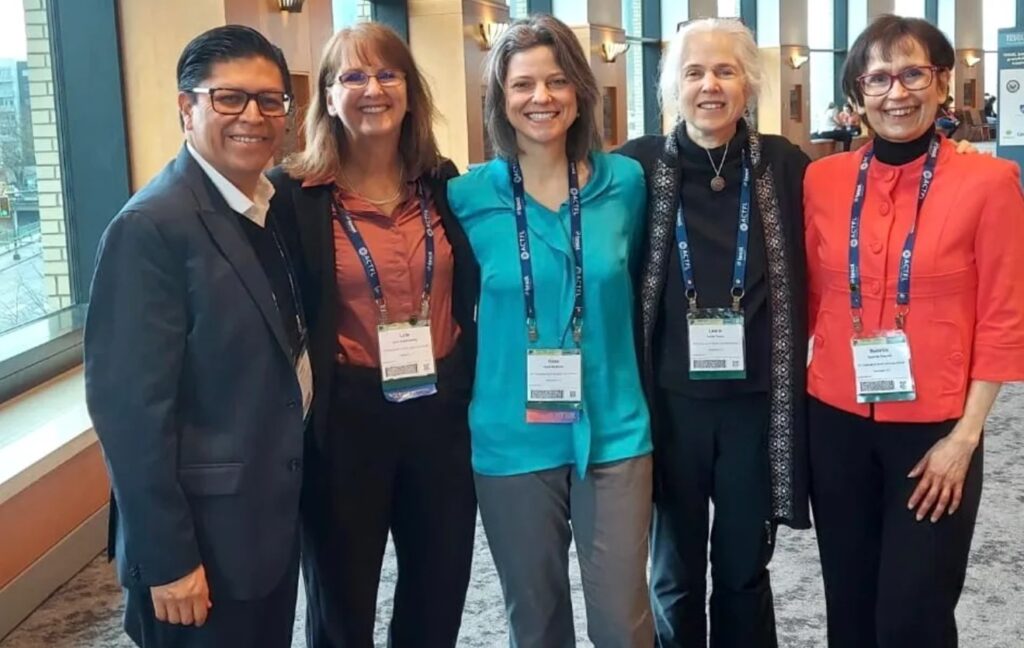World Learning, SIT professionals address importance of DEIA in language learning
March 30th, 2023 | DEIA, SIT Graduate Institute

A panel of World Learning and SIT practitioners and faculty spoke to the importance of diversity, equity, and inclusion in English-language learning at the TESOL International Convention and English Language Expo on March 24 in Portland, Oregon.
“DEIA is important now (and always has been) in language education because, at the core, cultural and language learning is always about bridging differences within oneself and in relationship to others,” said Dr. Leslie Turpin, chair of SIT’s master’s in TESOL program.
The panel also included TESOL Education Advisor Dr. Radmila Popovic, Senior Technical Education Specialist Dr. Kara McBride, and Curriculum and Training Education Advisor Lois Scott-Conley, all from World Learning. Their presentation was titled "Diversity, Inclusion, Equity, and Accessibility in English Language Education (DEIA).”
Speaking to a group of more than 50 English language professionals, the panelists covered DEIA principles specific to professional development courses as well as best practices for increasing DEIA in online teacher training and creative ways to incorporate gender equity and social inclusion through visual representation.
A DEIA mindset requires ongoing inner work, collaboration, inquiry, and struggle. Language classrooms are the perfect place to begin that work.
Dr. Leslie Turpin, chair, SIT MA in TESOL program
Discussion points highlighted the need to show a range of identities, backgrounds, abilities, and cultures in materials and create opportunities to help students overcome cultural, language, and skill barriers—all while ensuring content and technology can be accessed by all.
Popovic said ensuring the best DEIA practices in TESOL is a balance between the content that is being taught and the process of how it is taught.
Scott-Conley said when it comes to online learning, “content is process,” meaning that the way educators facilitate online learning is a significant part of how to teach teachers to teach online. She presented World Learning teaching principles that stress the need to scaffold all material; foster community and reflective practices; and develop a curriculum knowing learners will have diverse needs.
“If we plan to support learners at the margins, we go a long way toward creating more equitable, accessible, and inclusive learning environments for all diverse student populations,” Scott-Conley said.
Turpin talked about a program that welcomed more than 100 Afghan refugees to SIT’s Brattleboro, Vermont, campus last year.

Known today as World Learning’s New Vermonter Education Program, in partnership with the Ethiopian Community Development Council and Brattleboro Development Credit Corp., the program provides housing and education to refugees. SIT faculty and former faculty volunteers developed and implemented the English language and cultural immersion components of the program, which include five levels, from pre-literacy to advanced.
“Supporting diverse communities to work inclusively to learn together is central to any teacher’s job,” Turpin said. “We live and work in increasingly complex, diverse contexts mediated by evolving technologies—a DEIA mindset requires ongoing inner work, collaboration, inquiry, and struggle. Language classrooms are the perfect place to begin that work.”
The convention’s theme, “Inspiring Innovation and Empowering ELT Professionals,” offers a virtual registration option April 3-4. World Learning and SIT’s panel will be available virtually for registered attendees, allowing for a wider reach of its important content.
“Communication across diverse backgrounds and cultures is a critical component to achieving a peaceful and just world, and English has become the global lingua franca that supports much of this communication,” Scott-Conley said. “It is important that, in teaching English, we strive to honor diverse voices and lived experiences, examine our own biases and privileges, actively work to address inequities in our structures, and foster a community of open dialogue.”
World Learning’s SIT TESOL Certificate is a world-renowned English teaching certificate that provides specialized training and skills needed for a successful career teaching English as a second language and as a foreign language. The program’s curriculum is grounded in SIT’s MA in TESOL—one of the first master’s in TESOL in the U.S. This two-year master’s program offers specialties in plurilingual pedagogy, teaching refugees and displaced persons, and teacher training and education.
